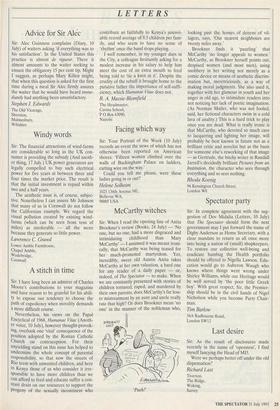McCarthy witches
Sir: When I read the opening line of Anita Brookner's review (Books, 24 July) — `No one, but no one, had a more disgraced and intimidating childhood than Mary McCarthy' — I assumed it was meant ironi- cally, that McCarthy was being teased for her much-promoted martyrdom. Yet, incredibly, sweet old Auntie Anita takes McCarthy at her own valuation, a hard one for any reader of a daily paper — or, indeed, of The Spectator — to make. When we are constantly presented with stories of children tortured, raped, and murdered by their own parents, does McCarthy's far less- er mistreatment by an aunt and uncle really rate that high? Or does Brookner mean 'no one' in the manner of the nobleman who,
looking past the homes of dozens of vil- lagers, says, 'Our nearest neighbours are twenty miles away.'
Brookner finds it 'puzzling' that McCarthy 'no longer appeals to women.' McCarthy, as Brookner herself points out, despised women (and most men), using snobbery in her writing not merely as a comic device or means of aesthetic discrim- ination but, meretriciously, as a way of making moral judgments. She also used it, together with her glamour in youth and her anger in old age, to intimidate readers into not noticing her lack of poetic imagination. (As Norman Mailer, who was not fooled, said, her fictional characters swim in a cold lava of anality.) This is a hard trick to play once you are dead. What is really ironic is that McCarthy, who devoted so much care to lacquering and lighting her image, will probably be best known in future not as a brilliant critic and novelist but as the basis for someone else's reworking of that image — as Gertrude, the bitchy writer in Randall Jarrell's decidedly brilliant Pictures from an Institution, the character who sees through everything and so sees nothing.
Rhoda Koenig
96 Kensington Church Street, London W8


















































 Previous page
Previous page